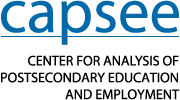Labor Market Returns to Community College Awards: Evidence From Michigan
By: Peter Riley Bahr, Susan Dynarski, Brian Jacob, Daniel Kreisman, Alfredo Sosa, & Mark Wiederspan | March 2015
This paper examines the relative labor market gains experienced by first-time college students who enrolled in five community colleges in Michigan in 2003 and 2004. It tracks credentials, credits, earnings, and employment for these students through 2011 and compares the labor market outcomes of those who earned a credential (associate degree or certificate) and those who enrolled but did not earn a credential. The data sources consist of administrative records data from the colleges, Unemployment Insurance earnings data from the State of Michigan, and enrollment and graduation data from the National Student Clearinghouse. The analytic sample consists of 20,581 students.
The authors find that students who were awarded a long-term certificate (referred to as a “diploma” in some states, including North Carolina) earned $2,500 to $3,600 more per year than did those without a credential, with the larger returns concentrated among men. For associate degrees, the estimated returns were $9,400 for women and $5,600 for men. Women saw little gain when awarded a short-term certificate, while men gained $5,200 per year. Estimated returns were highest in health-related and technical fields.
